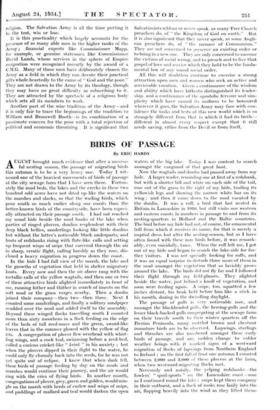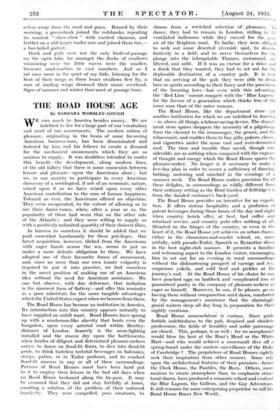BIRDS OF PASSAGE
By ERIC HARDY
AUGUST brought much evidence that after a success- ful nesting season, the passage of migrating birds this autumn is to be a very heavy one. Today I wit- nessed one of the heaviest movements of birds of passage at the city sewage farm that I have seen there. Fortun- ately the mud beds, the lakes and the creeks in these two hundred odd acres have not dried up• like the waters on the marshes and slacks, so that the wading birds, which pour south so much earlier along our coasts than the better-known birds of the countryside, have been especi- ally attracted on their passage south. I had not reached my usual hide beside the mud banks of the lake when parties of ringed plovers, dunlins resplendent with their deep black bellies, sanderlings looking like little dunlins but without the latter's noticeable black underparts, and hosts of redshanks rising with flute-like calls and setting up frequent wisps of snipe that careered through the air in sharp, erratic flight, calling harshly as they rose, dis- closed a heavy migration in progress down the coast.
In the hide I had full view of the marsh, the lake and the growths of vegetation that held in shelter migratory hosts. Every now and then the air above rang with the metallic calls of the yellow wagtails, and then one or two of these attractive birds alighted immediately in front of me, running hither and thither in search of insects on the soft mud or the grass verges nearby. Then a dunlin joined their company—then two—then three. Next I counted some sanderlings, and finally a solitary sandpiper scudded over the mud and added itself to the assembly. Beyond these winged flocks travelling south I counted more than sixty moorhens in a flock feeding on the edge of the beds of tall reed-mace and the green, sword-like leaves that in the summer glowed with the yellow of flag iris. A congregation of plover flew overhead with whist- ling wings, and a cock teal, swimming before a reed-bed, called a curious cricket-like " krink " in his anxiety ; but when the plovers dipped in their flight to the water, he could only fly clumsily back into the reeds, for he was not yet quite out of eclipse. I knew that when dark fell, these birds of passage feeding by day on the muds and marshes would continue their journey, and the air would ring with the cries of flying birds. In another month, congregations of plover, grey, green and golden, would min- gle on the marsh with herds of curlew and wisps of snipe, and paddlings of mallard and teal would darken the open waters of the big lake. Today I was content to search amongst the vanguard of that great host.
Now the wagtails and dunlin had passed away from my hide. A larger wader, reminding one at first of a redshank, but with a shorter bill and white on each side of the tail, rose out of the grass to the right of my hide, trailing its yellowish legs and showing the narrow white bar on its wing ; and then it came down to the mud vacated by the dunlin. It was a ruff, a bird that last nested in Britain in Lancashire in 1910, but still visits our western and eastern coasts in numbers in passage to and from its nesting-quarters in Holland and the Baltic countries. The bird before my hide had not, of course, the ornamental frill from which it receives its name, for that is merely a nuptial dress lost after the nesting-season, but as I have often found with these rare birds before, it was remark- ably, even suicidally, tame. When the ruff left me, I got out of my hide and began to search the lake-side for fur- ther visitors. I was not specially looking for ruffs, and it was an equal surprise to disturb three more of them in the mud amongst the vegetation that so lavishly grows around the lake. The birds did not fly far and I followed their flight through my field-glasses. They alighted beside the water, just behind a knoll of vegetation, and soon were feeding again. A snipe, too, squatted a few inches distant, his beak held before him like a stick in his mouth, dozing in the dwindling daylight.
The passage of gulls is very noticeable now, and amongst the blackheaded gulls, the herring-gulls and the lesser black-backed gulls congregating at the sewage farm on their travels south to their winter quarters off the Iberian Peninsula, many mottled brown and chestnut immature birds are to be observed. LapwingS, starlings and thrushes are also numbered amongst these early birds of passage, and any sudden change to colder weather brings with it marked signs of a westward migration of flocks of lapwings from Northern England to Ireland ; on the first fall of frost one autumn I counted between 2,000 and 3,000 of these plovers at the farm, when two westward-migrating flocks met.
Nervously and noisily, the yelping redshanks—the fowlers' " spoil-sports " on the Lancashire coast—rose as I continued round the lake : snipe kept them company in their outburst, and a flock of rooks rose lazily into the air, flapping heavily into the wind as they lifted them- selves away from the mud and grass. Roused by their warning, a greenshank joined the redshanks, repeating its musical " chew-chew " with excited clamour, and further on a still larger wader rose and joined them too,— a bar-tailed godwit.
Duck and gulls were not the only birds-of-passage on the open lake, for amongst the flocks of swallows winnowing over the little waves were the smaller, browner sand-martins in vast numbers.: And as I at once more in the quiet of my hide, listening for the beat of their wings as these lesser swallows flew by,' a roar of starling wings drowned their music overhead. Signs of summer and winter thus meet at passage time.



































 Previous page
Previous page